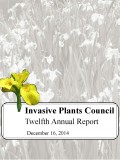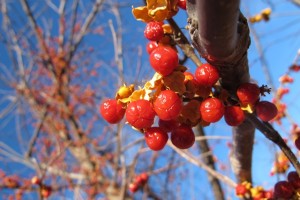To view the updated map of Mile-a-minute vine (Persicaria perfoliata) distribution in CT click here.
Mile-a-minute vine is a highly invasive annual weed spreading across Connecticut. It outcompetes and overgrows native species, causing ecological and economic harm. The vine scrambles over other vegetation and can climb trees and posts. Mile-a-minute is deserving of its common name and its reputation as “the Kudzu of the North” – a single vine can grow up to 6 inches per day! Mile-a-minute has been banned by the CT Legislature (Sec. 22a-381d of the CT General Statutes makes it illegal to transport, sell, cultivate or distribute the species), but populations are still spreading in natural areas and perhaps in your own backyard!
Please help us find, track and control this plant in Connecticut. With your help, we can organize and coordinate the removal of Mile-a-minute vine before it becomes an even bigger and more costly problem. Identification and contact information can be found at www.mam.uconn.edu.

